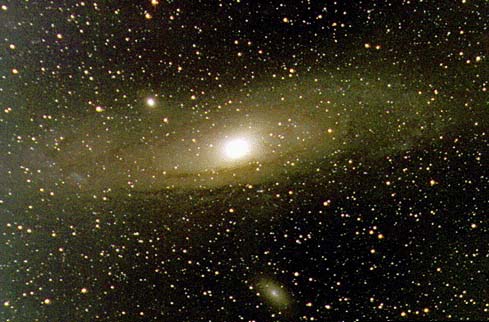(单词翻译:单击)
In just a fraction of a second after the Big Bang, the building blocks of our Universe begin to take shape. But this first matter is like nothing we see today.
大爆炸后短短的一瞬间,宇宙的组成元素开始出现。但第一种物质却并非今日所见。
The stuff of matter has been very different over the ages of the Universe. What we now think is normal matter was not at all normal in the earliest moments of the Big Bang.
宇宙形成百亿年以来,形成物质的元素不断变化。在现今宇宙里人们认为很常见的物质,在大爆炸最初时期并不存在。
That's because conditions were so extreme. There were no atoms yet. But there were tiny subatomic particles.

那是因为当时环境非常极端。那时还没有原子,只有微小的次原子粒子。
In the earliest moments of the Big Bang, the Universe was so hot and dense. There were great amounts of energy. And so particles will be created all the time and energy and matter will transform back and forth in this hot dense soup.
大爆炸最初那一刻,宇宙温度极高,密度极大,蕴含了巨大的能量。因此才一直有粒子生成,能量和物质在这高温高密的大熔炉里反反复复互相转化。
That earliest matter was too unstable to start forming the Universe as we know it. Think of it like this. Imagine rush hour at Grand Central in New York City as that superheated early Universe. The commuters racing through the main concourse are subatomic particles.
最早的物质太不稳定,从而不能形成我们所了解的宇宙。把纽约中心地带高峰期想像成炽热的早期宇宙,把在中央大厅飞速往返穿行的上班族想象成次原子粒子。
If you look at a crowd of people, a large crowd of people, they may appear randomly. That random, cocky motion is very similar to what was happening to the particles in the Universe in the earliest moments of the Big Bang.
如果你观察一群人,一大群人,他们可能是随机出现的。这种随机的运动与大爆炸最初宇宙内粒子的高速碰撞运动十分相似。
The extreme temperature of the early Universe energizes the subatomic particles. They appear. They disappear. They race around at incredible speeds. It's pure chaos.
早期宇宙内的高温提供给次原子粒子能量。它们不断创生,湮灭,以惊人的速率运动,宇宙内一片混乱。
It's like people. If they are excited and running around fast to catch trains at a train station, they have to move around quickly. But eventually they calm down and get slower. That's what's been happening to our Universe in a sense. The particles are moving around very fast and as Universe cools down, the particles move more slowly and in some sense, less randomly.
就像人类。如果人们在火车站为赶火车而到处奔跑,心烦意乱时,他们必须得快速移动。但是最终他们会平静下来,越跑越慢。从某种意义上宇宙也是这样,起初粒子四处飞移,当宇宙冷却,粒子运动越来越慢,从某种意义上不再那么随机了。
As the Universe cools, the particles stop changing back into energy.
当宇宙冷却,粒子不再转化回能量的形式。
可可原创,未经许可请勿转载


